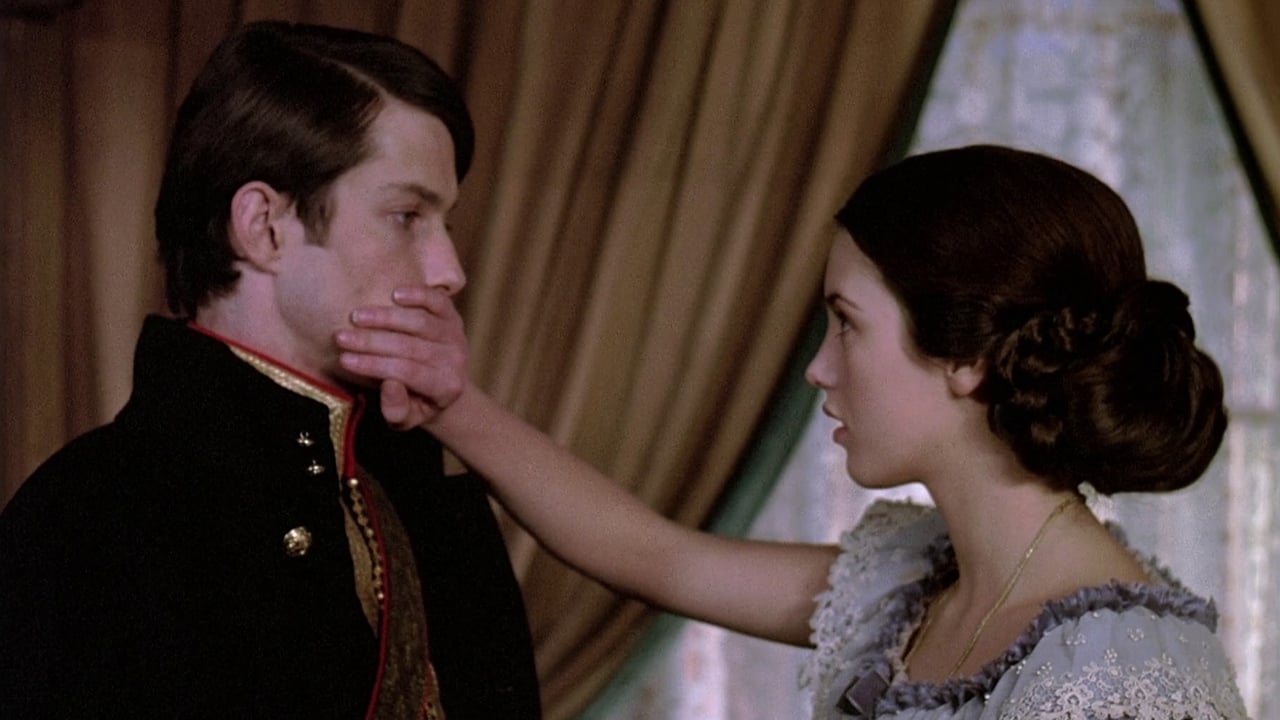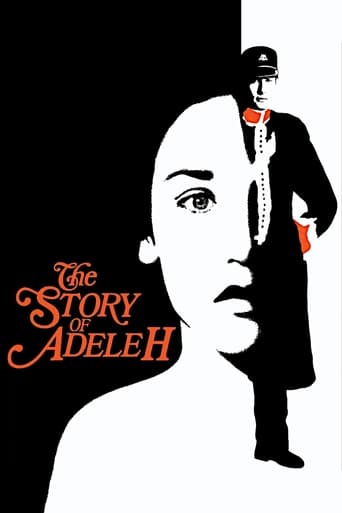

Although it has its amusing moments, in eneral the plot does not convince.
... View MoreI was totally surprised at how great this film.You could feel your paranoia rise as the film went on and as you gradually learned the details of the real situation.
... View MoreIt is encouraging that the film ends so strongly.Otherwise, it wouldn't have been a particularly memorable film
... View More.Like the great film, it's made with a great deal of visible affection both in front of and behind the camera.
... View MoreFrench New Wave screenwriter, film critic, actor, producer and director Francois Truffaut's 14th feature film which he co-wrote with French screenwriter Jean Gruault and French screenwriter and director Suzanne Schiffman (1929-2001), is based on American academic Frances Vernor Guille's book "Le Journal d'Adèle Hugo" from 1968. It was shot on locations at St Peter Port, Guernesey, the Bailiwik of Guernsey, Channel Islands in France, Barbados and Senegal. It premiered in France, was screened at the 13th New York Film Festival in 1975 and was produced by French film producer and actor Marcel Berbert and French screenwriter, producer and director Claude Miller (1942-2012). It tells the story about Adèle Hugo, the second daughter of French poet Victor Hugo (1802-1885), who in 1863 during the second year of the American Civil War travels under the assumed name of Miss Lewly from France to Canadian Halifax. There she meets the elder couple Mr. and Mrs. Saunders who runs a boarding house and who lets her stay with them. Adéle has made her journey to find a man named Lt. Albert Pinso who is stationed there with British troops, and she begins her search by contacting a local notary.Precisely and subtly directed by French filmmaker Francois Truffaut (1932-1984), this finely tuned and biographical story which is narrated from the protagonist's viewpoint, draws an incisive portrayal of a woman's unconditional and irrevocable devotion to man whom unknowingly has captured her heart. While notable for it's atmospheric milieu depictions, sterling production design by French production designer Jean-Pierre Kohut-Svelko, cinematography by Spanish cinematographer Néstor Almendros (1930-1992), costume design by costume designer Jacqueline Guyot, fine editing by French film editors Martine Barraqué and Yann Dedet and prominent use of colors, this character-driven and narrative-driven period piece depicts a scrutinizing study of character and contains a good score by French composer Maurice Jaubert (1900-1940).This historic, tragic and romantic late 19th century drama from the mid-1970s about a young and cultivated woman's afflicting and obsessive infatuation with a British officer she has chosen as her one and only, which is one of Francois Truffaut's most complicated and ambitious productions, is impelled and reinforced by it's cogent narrative structure, substantial character development and the gripping and internal acting performance by French actress Isabelle Adjani. A cinematographic, literary and psychological love-story from the mid-1970s which gained, among other awards, the NSFC Award for Best Actress Isabelle Adjani at the 10th National Society of Film Critics Awards in 1975.
... View MoreStory of Adele H, The (1975)*** (out of 4) Isabelle Adjani picked up an Academy Award nomination for her performance of Victor Hugo's second daughter Adele who follows Lt. Pinson (Bruce Robinson) to Halifax where her obsession with him quickly turns to madness. We follow Adele as she first arrives in Halifax and tries to get the man to marry her but when he refuses we see her continue various attempts in getting what she wants but each time these attempts just become more outlandish. THE STORY OF ADELE H appears to get fairly mixed reviews. Some call it a masterpiece and one of the director's best works while others call it cold and forgettable. I guess I'm in the middle because I thought the film was terrific to look at and we also get a great performance by Adjani but in the end it was just impossible for me to connect with this character or care a bit about her. There's no denying that this is an incredible film to look at as director Truffaut does a marvelous job in capturing the mood and look of the 1860s. No matter what was happening on the screen I simply couldn't take my eyes off the costumes, sets and even the buildings. There's one very quick sequence where Adele is walking through a snowstorm and passes out. Even the look of the snow was rather hypnotizing to and beautifully shot. Truffaut takes his time telling the story and this actually builds up a pretty good atmosphere and the way he reveals the woman's obsession and how he shows it turning into this craziness is picked up very well with the slower pace. Adjani certainly deserves all the praise because she's simply divine no matter what personality she's playing. There's a scene early in the movie where she's staying at a house and the soldier comes to visit her. The way Adjani goes from normal to mad in the matter of seconds was extremely believable and there wasn't a false move by her anywhere in the film. The supporting players fit their parts well, although no one really stands out. The one flaw I had with the film was the fact that I never really connected to Adele nor did I ever really begin to feel for her. The only thing that kept me connected to her was knowing she was the daughter of Victor Hugo who of course is a legend. If this had been anyone else in the world then it's doubtful I would have connected to her for anything. The film is still worth viewing if you're a fan of the director but in terms of his career I'd say this isn't nearly his best work.
... View MoreThis is an incredibly sad movie to watch because you know that Adele was a REAL person who lived an incredibly screwed up and sad life. She was completely wrapped up in her dream of marrying a British soldier--so much that she followed him across the Atlantic, tells her parents she married him (after he repeatedly refused to do so) and planned the details of her life around this obsession. Slowly, she moves from a form of Obsessive-Compulsive disorder to Schizophrenia and it is especially apparent in the last portion of the movie.I really liked Isabelle Adjani's acting--she and the director (Truffaut) really pulled you into her world and it seemed quite poignant. However, the treatment of her love (who was completely indifferent to her) seemed rather superficial. Despite the pains she put him through, his emotional range in response to this MINIMAL and this is the biggest drawback in the movie. However, as the movie is HER story and this is handled so well, I still give the movie a 9. It could have gotten a 10 if it explored him better and if it explained WHY Adele's famous father (Victor Hugo) did so little to stop her on her self-destructive decline. He only acted once she was undeniably mad.
... View MoreF. Truffautt said that Adele H is about a"face",the beautiful face of Adjani.The indomitable Adele seems to love to much,her passion and intensity proves of how dangerous a "love obsession" could be. Adjani performance sometimes is very disturbing,and she really shines as this dark,genuine,amazing young woman,Adele H is not the most popular of Truffautt movies ,but IMHO is his most solid work,you don't need to be his "fan" to appreciate it.
... View More